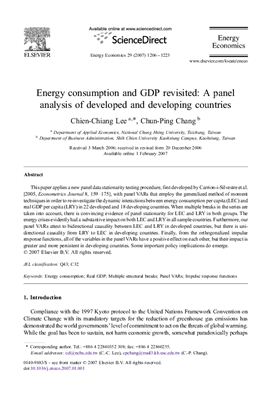На английский языке. Статья опубликована в ж. Energy Economics,
2007, V. 29, P. 1206–1223.
This paper applies a new panel data stationarity testing procedure, first developed by Carrion-i-Silvestre et al. [2005, Econometrics Joual 8, 159–175], with panel VARs that employ the generalized method of moment techniques in order to re-investigate the dynamic interactions between energy consumption per capita (LEC) and real GDP per capita (LRY) in 22 developed and 18 developing countries. When multiple breaks in the series are taken into account, there is convincing evidence of panel stationarity for LEC and LRY in both groups. The energy crises evidently had a substantive impact on both LEC and LRYin all sample countries. Furthermore, our panel VARs attest to bidirectional causality between LEC and LRY in developed countries, but there is unidirectional causality from LRY to LEC in developing countries. Finally, from the orthogonalized impulse response functions, all of the variables in the panel VARs have a positive effect on each other, but their impact is greater and more persistent in developing countries. Some important policy implications do emerge.
This paper applies a new panel data stationarity testing procedure, first developed by Carrion-i-Silvestre et al. [2005, Econometrics Joual 8, 159–175], with panel VARs that employ the generalized method of moment techniques in order to re-investigate the dynamic interactions between energy consumption per capita (LEC) and real GDP per capita (LRY) in 22 developed and 18 developing countries. When multiple breaks in the series are taken into account, there is convincing evidence of panel stationarity for LEC and LRY in both groups. The energy crises evidently had a substantive impact on both LEC and LRYin all sample countries. Furthermore, our panel VARs attest to bidirectional causality between LEC and LRY in developed countries, but there is unidirectional causality from LRY to LEC in developing countries. Finally, from the orthogonalized impulse response functions, all of the variables in the panel VARs have a positive effect on each other, but their impact is greater and more persistent in developing countries. Some important policy implications do emerge.

